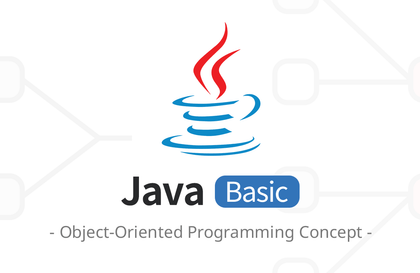
김영한의 실전 자바 - 기본편
김영한
$44,000.00
Basic / Java, 객체지향
5.0
(1,689)
실무에 필요한 자바 객체 지향의 핵심 개념을 예제 코드를 통해 쉽게 학습합니다.
Basic
Java, 객체지향
This course will cover everything you need to know about Spring Boot for practical use.
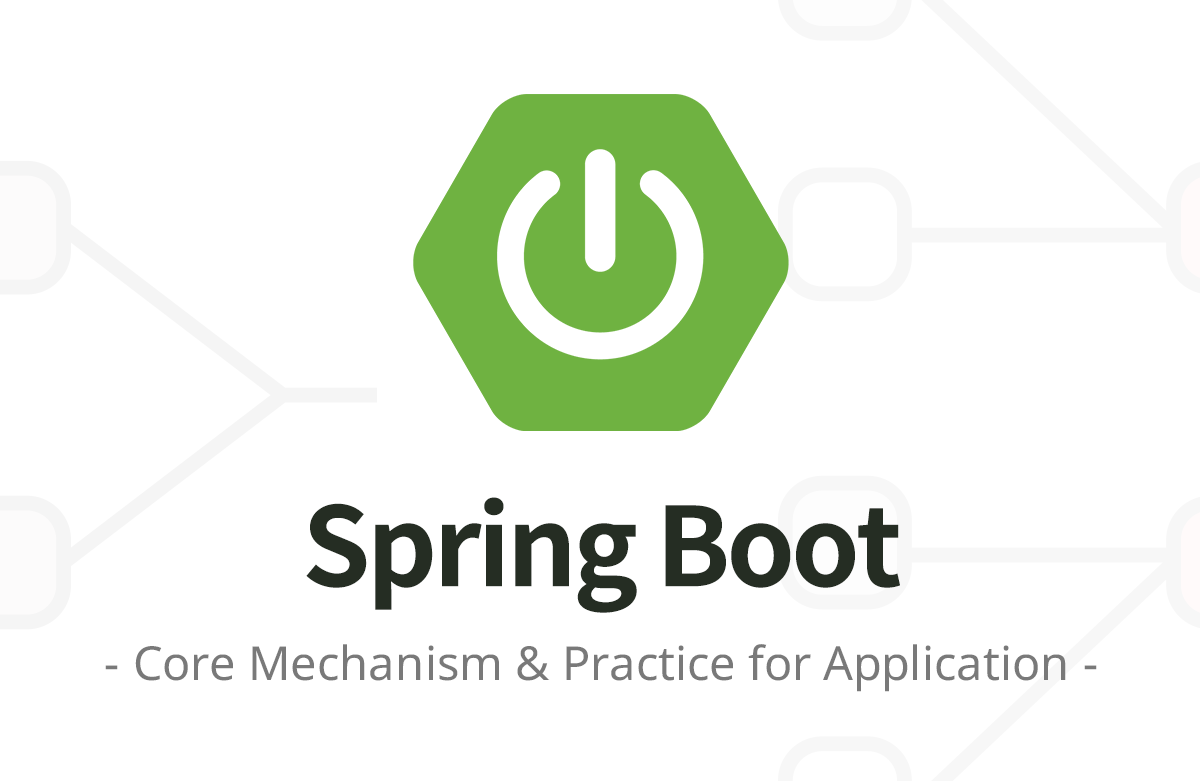
Internal working principle of Spring Boot
Creating a Spring Boot Library
Understanding the core features provided by Spring Boot
Monitoring using Spring Boot
The ultimate Spring Boot for backend developers!
Contains all the content you need for practical use.
🚩 This lecture is the last lecture of "Kim Young-han's Spring Complete Conquest Series." If you are new to Spring, please check the Spring Complete Conquest Roadmap by Woowa Brothers' youngest technical director, Kim Young-han, before taking the course. (Go to Roadmap)

The Spring Framework is a huge technology that has evolved over the past 20 years.
It solves most of the technical problems that occur in practice and provides high stability and flexibility. That's why most major companies that use Java use Spring. Spring is the de facto standard technology used in the Java camp .
However, the Spring Framework has so many features and is so extensive that it can be overwhelming to know where to start.
Also, because it provides so much flexibility, it is difficult to choose which technologies to use together. As features increase, more and more configurations start to be required. So many developers start to feel that Spring is heavy and inconvenient.

Spring Boot, as its name suggests, starts from Boot. Spring Boot is a technology that helps you get started with Spring very easily and conveniently, and provides developers with numerous convenient functions. With the advent of Spring Boot, Spring, which used to feel huge and inconvenient, has become very easy and convenient to get started with.
Most projects that use Spring now use Spring Boot as a prerequisite. Spring technology was finally completed with the advent of Spring Boot .
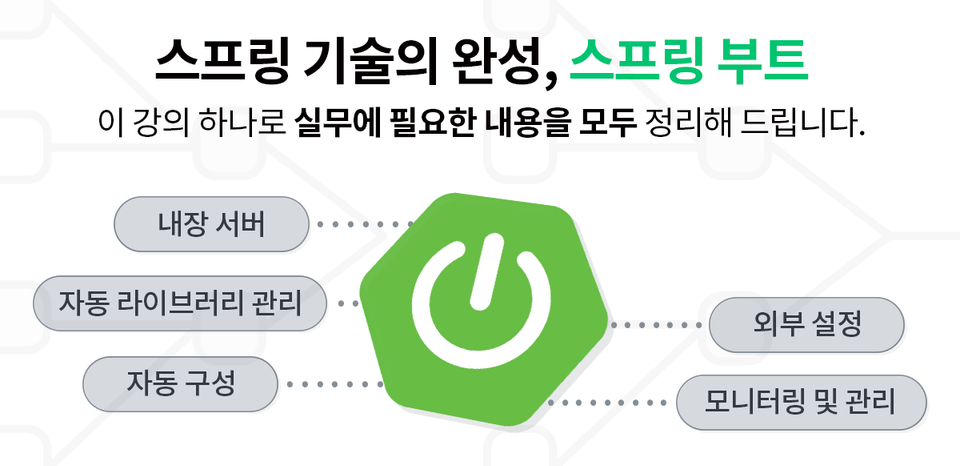
Spring Boot provides five core features to help you use the Spring Framework conveniently. This lecture also focuses on these five core features.
01
Built-in server
You can easily develop and deploy web applications without having to install a separate server.
02
Automatic library management
Start your projects quickly and easily by automatically selecting and managing hundreds of libraries based on best practices.
03
Auto configuration
By automating complex Spring configurations, developers can develop applications easily and quickly.
04
External settings
You can conveniently check the external settings required when using an application in different environments, such as development environment ↔ operating environment.
05
Monitoring & Management Features
Provides the ability to automatically collect/monitor/manage numerous metrics for your application.
Making Spring technology even more powerful
Master 5 Core Spring Boot Features
We will teach you the core features of Spring Boot that are essential in practice through example code.
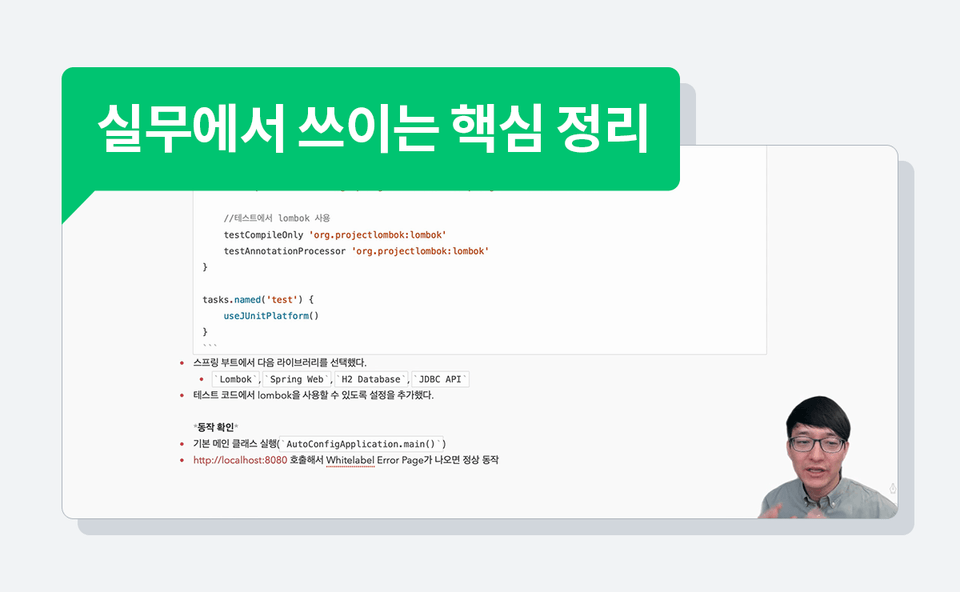
We will cover all the Spring Boot you need for practical work in one lecture.
Spring Boot is very convenient, but it provides too many functions. You shouldn't learn it broadly, and if you go too deep, it won't be of much help in practice. So I prepared a lecture so that you can naturally understand the core principles and frequently used functions that are important in practice through example code.
We have boldly excluded features that are not very important or are not frequently used in practice. We have also included an effective monitoring method using Spring Boot that many people are curious about.
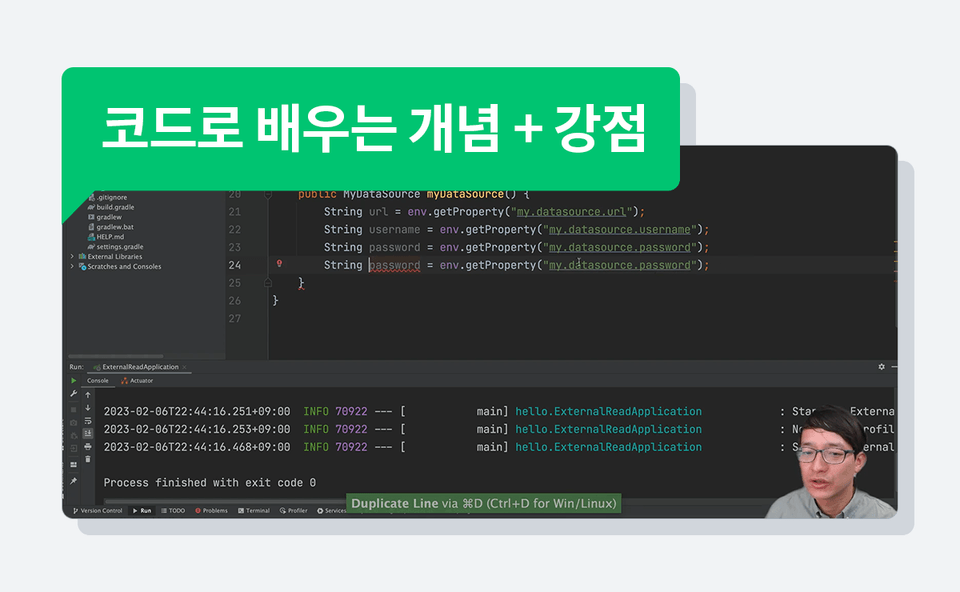
You can understand the principles naturally through example code.
You can naturally understand the magical principles of Spring Boot through example code. This course starts from the time when there was no Spring Boot. Then, as Spring Boot is gradually introduced, you can naturally understand the core concepts and strengths of Spring Boot through code.
Instead of complex theories, we will teach you practical best practices so that you can naturally understand the principles of Spring Boot, which is necessary for backend development, through the process of implementing example code.
📢 Note! This course is suitable for those who have experience learning Spring.
💡 This course is for backend developers and job seekers who want to understand Spring Boot easily and deeply through code . In addition, it is composed of content that will be helpful to those who are already using Spring Boot in practice but want to properly understand and use the core principles of Spring Boot .

This article introduces why Spring Boot was created and what Spring Boot is all about.
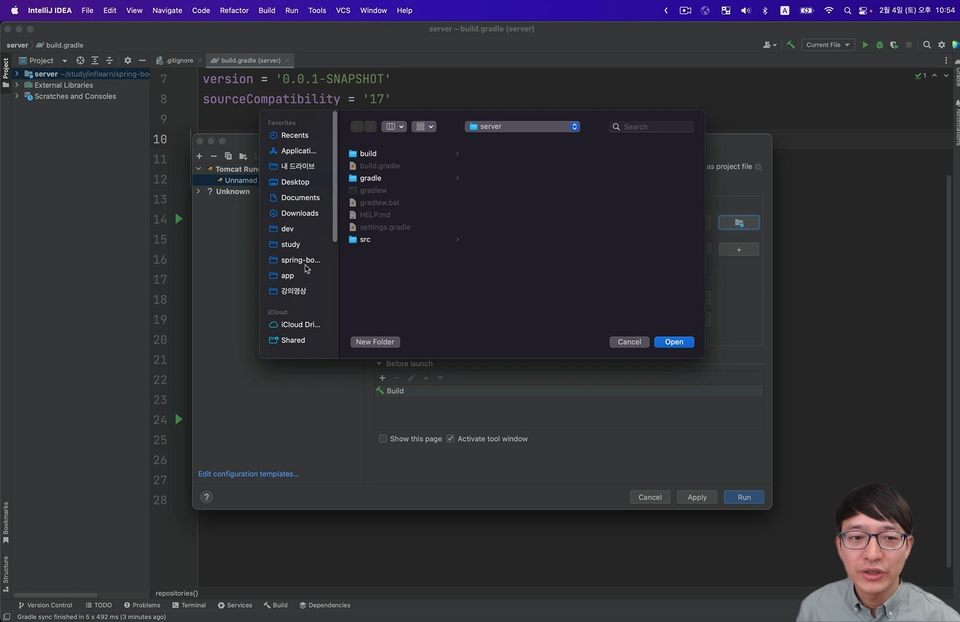
Going back a long time ago, I will explain step by step how to install a web server like Tomcat directly and build a web application as a WAR file and deploy it, and how to use a web server conveniently with a single JAR file using Spring Boot and embedded Tomcat like now. You will understand why it has developed this way, and in the process, you will naturally understand the principles of how the embedded server of Spring Boot works.
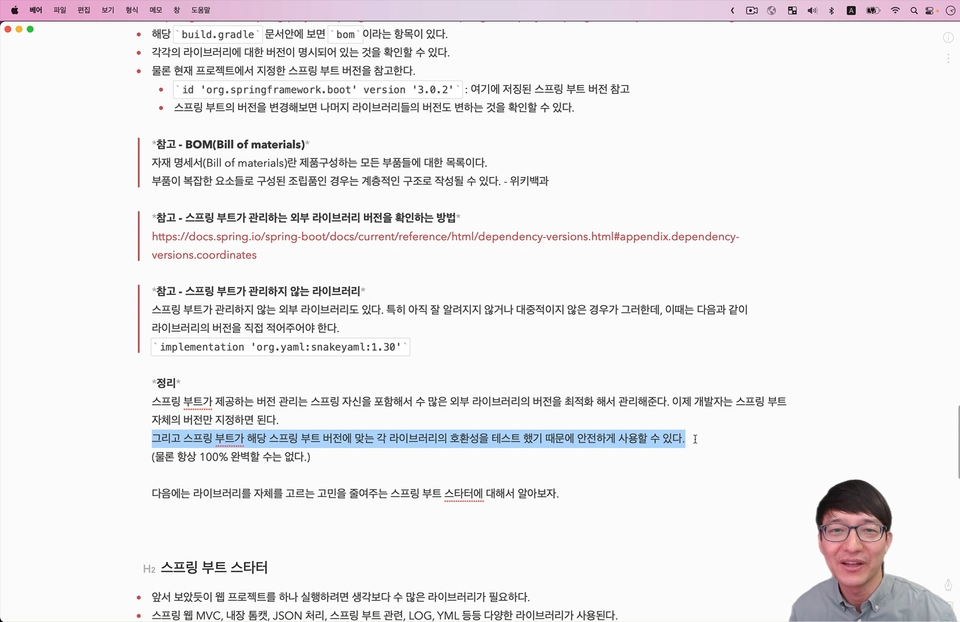
Learn about the challenges of manually selecting and managing multiple libraries, how Spring Boot addresses these challenges, and learn about the Spring Boot starter libraries.
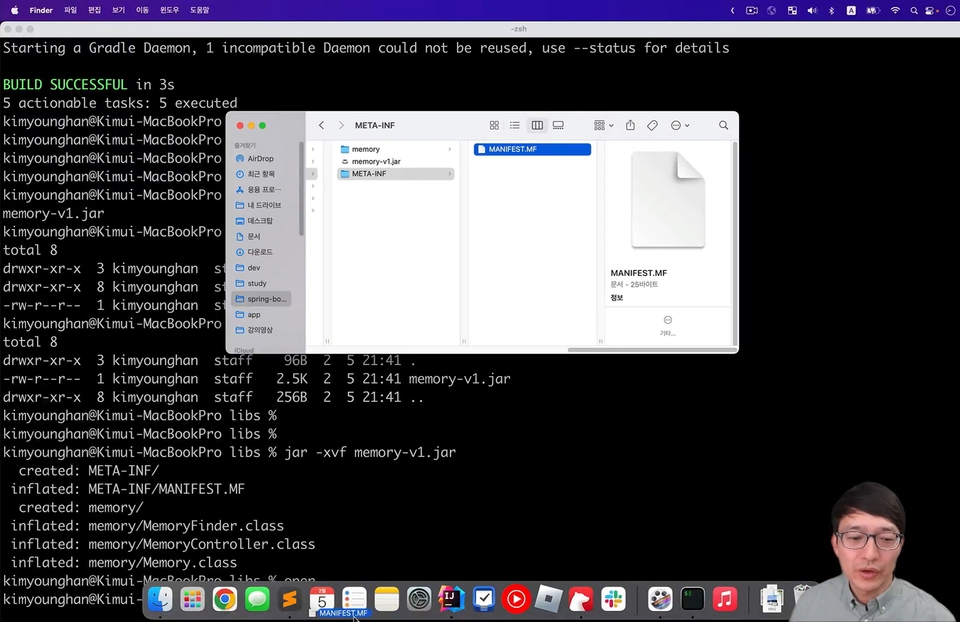
Spring Boot automates many features. The most representative feature is Auto Configuration. Thanks to this feature, developers do not have to register numerous Spring beans directly. However, if you do not understand the principle of auto configuration, it is difficult to solve the fundamental problem when a problem occurs while using Spring Boot.
In this lecture, you can easily understand the principle of automatic configuration, which is a core feature of Spring Boot, through examples. And you will also learn how to create and provide such automatic configuration yourself.
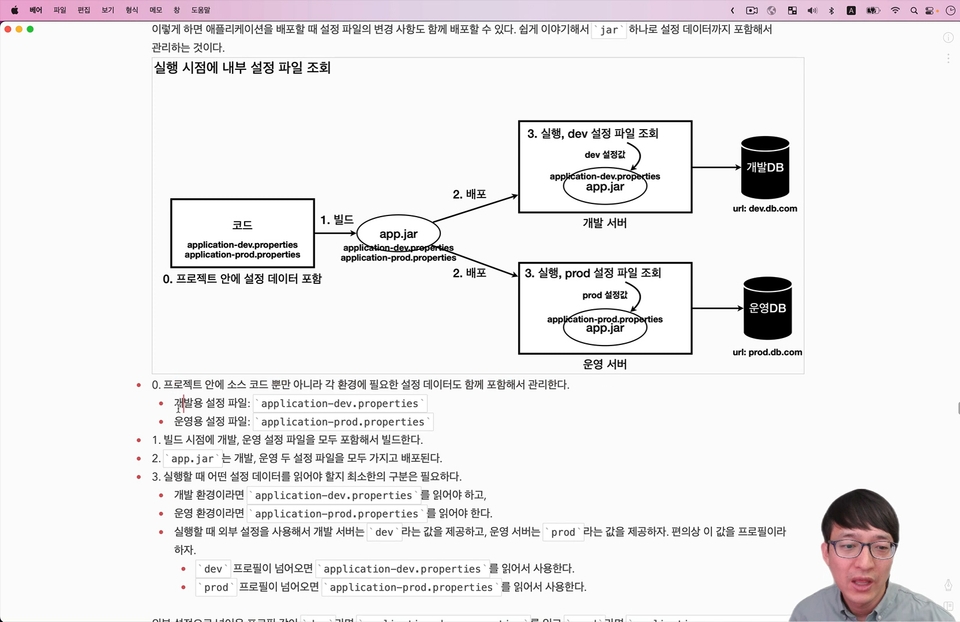
We start with how to use external configuration directly without Spring Boot. (OS environment variables, Java system properties, command line arguments, etc.) Then, we learn about the problems that occur when using external configuration directly and how Spring Boot solves these problems step by step. Furthermore, we learn the reason for the appearance and usage of Environment, @Value, and @ConfigurationProperties through examples.
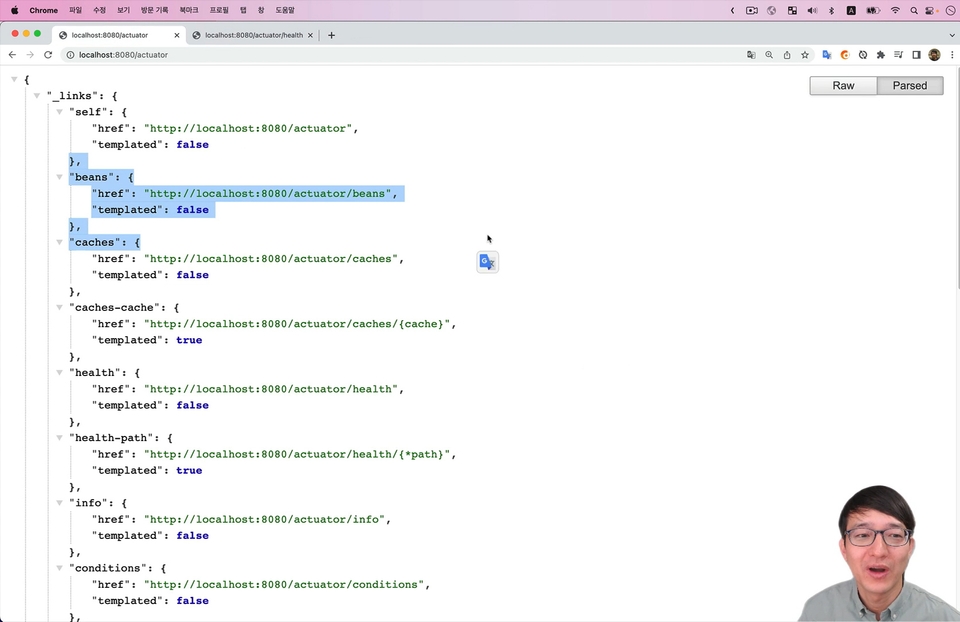
To operate a service in a real operating environment, monitoring the application beyond simple functional requirements is very important. Learn about the various functions and monitoring features provided by Spring Boot Actuator.
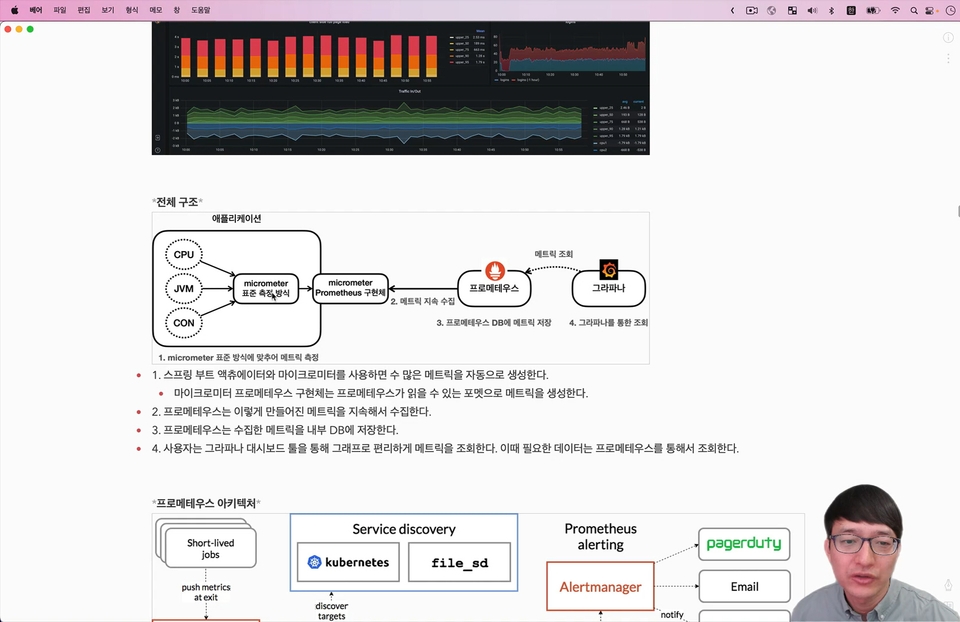
There is a saying that goes, “A commander who fails in battle can be forgiven, but a commander who fails on the border cannot be forgiven.” If we apply this saying to developers who operate services, it means that monitoring must be done well, even though failures can occur at any time.
We will explain how to build a monitoring environment using Prometheus and Grafana, monitoring tools that are widely used in recent practice. We will also learn how to identify problems through monitoring tools while increasing actual CPU, memory, and DB connection usage in the monitoring environment built in this way.
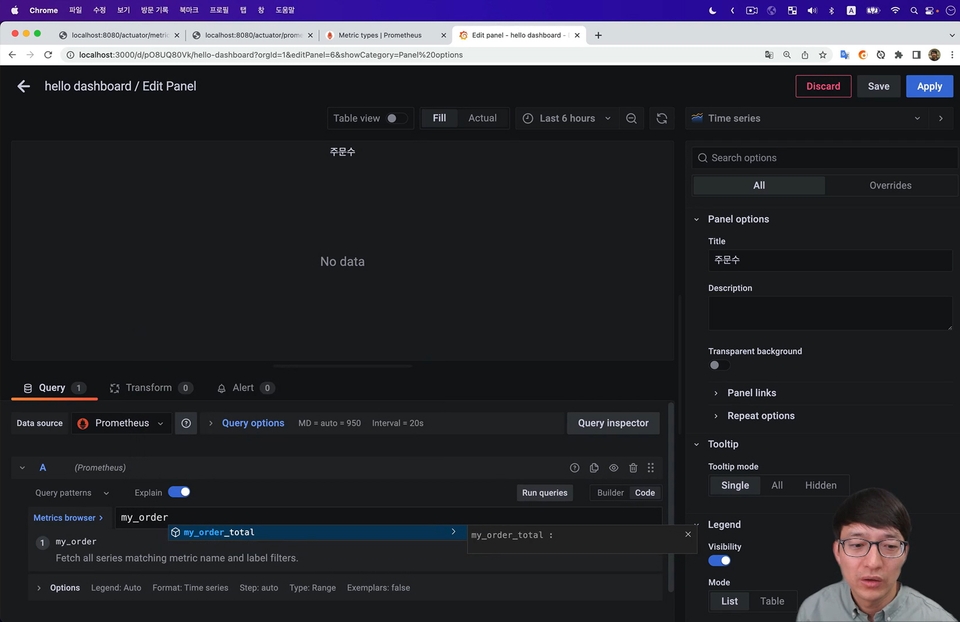
We will explain how to embed the necessary indicators for monitoring directly into the application and check them through the monitoring dashboard. We will also learn how to measure the number of calls, average execution time, and maximum execution time of the business logic you want to track with a single annotation using a convenient tool called Micrometer. And we will also teach you how to properly monitor in practice.




This lecture is the final lecture of the " Spring Complete Conquest Series " . This roadmap is aimed at Java backend developers who aim to conquer Spring and aim to completely master the core of Spring used in actual practice.
For those who have completed the "Spring Complete Mastery Series", we recommend the " Spring Boot and JPA Practical Complete Mastery Roadmap " where you can learn while creating web applications using the latest practical technologies.
Lecture List
Web Development No.1 Bestseller
If you have mastered all the contents of the roadmap, your Spring fundamentals will reach a level that is quite competitive in practice. We hope that you will master Spring through this roadmap and achieve your desired goals!
Who is this course right for?
Developers who want to deeply understand Spring Boot
Developers who want to easily understand Spring Boot in code
Developer Job Seeker
Developers who use Spring Boot in practice but want to understand and use the core principles of Spring Boot properly
Need to know before starting?
Java language
Spring Learning Experience
536,354
Students
34,063
Reviews
8,878
Answers
5.0
Rating
22
Courses
교육자
전: 우아한형제들 기술이사, 카카오, SK플래닛
진짜 실무에 필요한 제대로 된 개발자가 될 수 있도록, 교육하는 것이 저의 목표입니다.
EO 인터뷰 영상
개발바닥 - 시골 청년 개발왕 되다
All
107 lectures ∙ (15hr 45min)
Course Materials:
All
387 reviews
5.0
387 reviews
Reviews 9
∙
Average Rating 5.0
5
I first got a job as a node.js developer and worked hard for a year at a black company, without being paid for up to 3 months, without any evenings or weekends. Eventually, I had health problems and had to take a break. At the crossroads of whether to go to a welding academy to learn welding skills or switch to a Java/Spring developer with a wider market, I thought it was really the last time and signed up for Younghan's Spring lecture and took it. During that process, I didn't have any money, so I studied for about 8 months while worrying about how many ramen I could eat a week, and now I've joined a decent mid-sized IT service company and it's been quite some time. Thanks to Younghan's lecture, I was able to build a solid foundation and I've grown into a recognized employee at the company and a trusted developer on the team. (Personally, I think the best thing is that I can live looking forward to the future rather than the present, lol) In each lecture, I was often impressed by the step-by-step order or documentation that beginners can't come up with without thinking deeply. Just as the current Younghannim lectures have been for me, I hope that you will continue to create lectures that can lend a helping hand to those who are lost and troubled like I was back then. Thank you!
xellos I've read the course review you left more than 10 times. It's a story similar to mine in the past, so it really stayed in my mind. So far, I've seen some really great new recruits who have used the 8 months of their time to prepare for employment very cohesively. I think xellos is one of those people. Regardless of age and experience, I think it's really admirable to live the 8 months of your life cohesively and immersively. In the end, you must have spent 8 months more valuable than someone else's several years. xellos, I sincerely thank you for giving me that time and for believing in me and being with me. xellos, this is just the beginning. I hope you will always grow with technical humility. I will also share the knowledge and wisdom I have gained through my experience so far to help more developers grow well. Thank you.
Reviews 13
∙
Average Rating 4.4
5
I haven't listened to all the lectures yet, but I always really like Younghan's lectures because they always explain things from the beginning, whether it's Spring or JPA, in an easy-to-understand way. This was a chance for me, who only knew the concept that Boot would set things up for me, to learn exactly how to set things up and what inconveniences it solves! I really like how you explain things one by one in an easy-to-understand way! Please make more good lectures!
wnsqud70, I wanted to teach you Spring Boot one by one while gradually gaining knowledge, and it was worth the effort. Thank you for listening attentively.
Reviews 17
∙
Average Rating 4.8
5
As soon as the lecture was released, I bought it and watched all the lectures, even during the Samiljeol holiday. There were parts I already knew and parts I encountered new, and it was a fun time. When I watch general video lectures, they often show ~~ like this ~ without context or flow and end. In the past, (Hellfire Peninsula) was like this, but there was a process in the middle.. I experienced it myself and learned it, and now, as a better alternative, they show ~~ like this ~~, so I muttered to myself a lot while watching the lecture.ㅎㅎ That's right!! That's how it was ~ It used to be like that ㅎㅎㅎ (And come to think of it, I've been a developer for 13 years too... Ugh..) I think it would be good for many backend Spring developers to overcome their vague fears or difficulties about Spring Boot through this lecture. And I think their understanding of the technology they are using will increase. Many instructors are trying and releasing content that teaches how to use the framework, but I think this lecture is the only one that includes detailed content and practical content on the parts that should be utilized from a system operation perspective rather than a program perspective. If you look at recent job postings, the service operation experience ~ section is starting to be included as a required element, so I hope that those who are still juniors will gain indirect experience in responding to failures through this lecture. What I left from the long lecture was pinpoint pinpoint... It echoes. I'm going to install it. I hope you all have a happy and enjoyable developer life..... Thank you.
Sang Do Park, you said you are a 13-year developer, so I think you would have a lot to relate to in the story. ㅎㅎ This time, I wanted to make sure that developers know about this system operation and monitoring method, especially from a system operation perspective, and I was a bit greedy about the latter part. In fact, those who work at companies with very well-established infrastructure may have already experienced this, but most people don't, so I wanted to share this part and give them some direction. After reading Sang Do Park's course review, I think it was a good idea to be greedy. Thank you so much for listening so diligently.
Reviews 5
∙
Average Rating 4.6
5
I haven't heard everything yet, but it's definitely instructor Kim Young-han.. The lectures are so focused, and the lecture videos have become better than the ones from 3 years ago, where they only showed the room, and they've removed the background and only showed the instructor.. Thank you always.
Mr. Oh Seung-woo, I prepared hard, so thank you for saying that it was as expected^^ I, too, am gradually improving as I film more and more. Thanks to your support, I was able to come this far. I sincerely thank you.
Reviews 9
∙
Average Rating 4.9
5
Finally, everyone is here. I really enjoyed the lectures of Kim Young-han, who I always trust and watch. The company I work for is SI, so I never did proper monitoring. I just fixed it when a client contacted me about a problem, and I never thought about introducing separate monitoring. However, while listening to this lecture, I was able to learn how important monitoring is and how easy it is to handle monitoring using Spring Boot. I'm going to apply this to my work. The stories in the "Next" chapter really resonate with me. I'm a 3rd-year SI backend junior developer who wants to move to a major service company, and I have a lot of concerns. I'm studying hard, but in practice, I repeat the development I've done (mainly CRUD), so there's nothing worth writing on my resume. Even if I wanted to write something on my resume, the only things I've worked on are "developed an admin page" and "created an automatic deployment script", so there's nothing to write. Even if I write down the improvements I made, I often wonder if they are really worth putting on my resume. At the same time, I also wonder if I am expecting too much from a junior developer who has only been working for 2 years and 3 months. If 2 years and 3 months had passed since I went to the Nekaraku Cup, would I have built a great career? When I think about these things, all I am left with is worries, and even if I study after work, all I get is worries. What level do you want from a 3rd-year backend developer? I am running like crazy because I don't want to fail at changing jobs, but since I don't know this, it feels like I am running through a tunnel with no exit. Of course, even if I know, I won't be able to see the exit right away, but I think the vague fear will go away.
Bada Kang, it's good to have a big goal from the beginning, but if you continue to study and work hard, your skills will continue to build up, and it's also a good idea to move to a slightly better environment based on that. If you steadily build your skills and receive continuous feedback while interviewing, you'll be able to find your direction faster. The following video will be helpful https://youtu.be/QHlyr8soUDM I'm rooting for you!
Check out other courses by the instructor!
Explore other courses in the same field!
$77.00